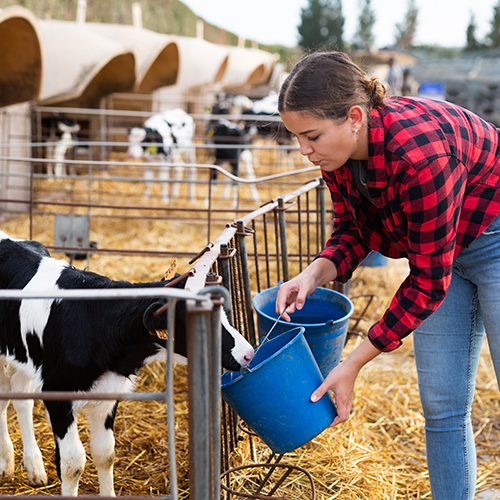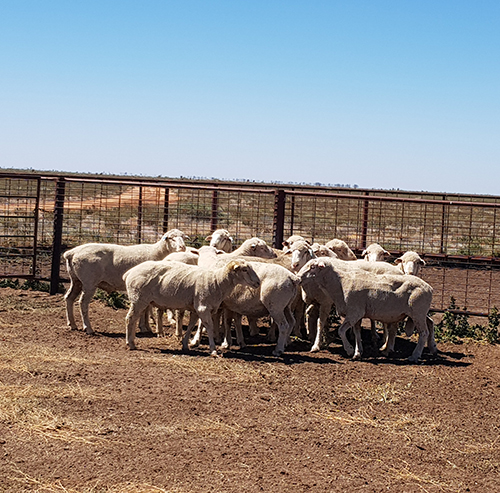The Certificate II in Rural Operations provides an important pathway into work for many learners, particularly in northern Australia.
Skills Insight is reviewing the qualification so it accurately reflects the evolving skills needs of industry, learners and contemporary qualification design.
Click across the tabs to view active and completed project stages. Consultation takes place at every stage of the project.
The Certificate II in Rural Operations is a qualification used to provide learners with the foundational skills required for roles in rural and regional industries. It has had an average of 2500 enrolments a year between 2018 and 2022, and is particularly used in northern regions of Australia.
During a project in 2022, issues were raised about the Certificate II in Rural Operations that required further investigation to resolve. The qualification is due for a review to see if it accurately reflects the evolving skills needs of industry and learners.
It is important that all qualifications have distinct outcomes so that learners and employers can have confidence and clarity in what skills are being attained through training. It is equally important that learners in rural, regional and remote areas have access to training that can equip them with skills required to enter the workforce.

This project will undertake research and in-depth analysis of the Certificate II in Rural Operations to better understand how the qualification is used (particularly in the northern region of Australia), and to clearly identify the intended job roles attainable upon completion of the qualification. These findings will be used to assess how the unique needs of the learners and workplaces that require these skills can be better met in future, while meeting the current requirements of policies that apply to Training Package products.
Issues raised with Certificate II in Rural Operations
According to the qualification description, the Certificate II in Rural Operations ‘provides an occupational outcome for industries and agencies in rural and regional Australia’, and ‘Depending on the units selected individuals can be employed not only in rural industries but also other rural and regional sectors, such as local government, tourism, hospitality, transport, construction, community services, information technology and metals’. Consultation is required to identify how the qualification is being used to prepare workers for various industries and whether the necessary skills for each are reflected.
The qualification also also contains similar content to the Certificate II in Agriculture, with all of the core units of the Rural Operations qualification appearing in the core of the Certificate II in Agriculture. A review of the electives within the Certificate II in Rural Operations could help determine if the qualification provides enough standalone value as part of the training solution for industry or whether it could be enhanced to better support skills not captured in the Certificate II in Agriculture.
Timeline

Subscribe for updates
If you would like to receive updates about this project, please subscribe to our newsletter and select ‘agriculture, horticulture, conservation and land management’ as one of your industries of interest.
Project Scope
The initial stages of this project will focus on research into how the Certificate II in Rural Operations is being used, which will determine the direction of the rest of the project.
Thorough consultation with relevant stakeholders will expand on the findings of the Research Summary and Product Development Proposal report to:
Project Team

Rebecca Ford
Project Manager, Skills Insight
[email protected]

Brendan White
Stakeholder Engagement Manager, Skills Insight
[email protected]
In the evaluation of the options, it is important to gain broad consensus and support from the key project stakeholders, including:
Further consultation will take place as necessary to guide the development or revision of any training products as needed. Any work undertaken will also adhere to the Training Package Organising Framework (TPOF) so that the training products are high quality and consistent. The aim is to better meet the unique needs of workplaces and learners in rural and remote areas.
Opportunities for stakeholder input
Stakeholder input is appreciated throughout the duration of this project. A list of key stakeholder organisations has been identified and Skills Insight ensure contact is made with each of these organisations during the development of the project. Consultation is not limited to the organisations on this list. The list simply helps us to identify those organisations that, because of their industry role, size or specialty, are likely to have a key interest in the development and outcomes of this project. If you are aware of an organisation that you think should be involved, please contact the project team.
For updates and consultation opportunities, please follow the newsletter subscription link above. Alternatively, please feel free to contact the project manager, Rebecca Ford on 03 9321 3526 or [email protected]

This project has recommenced following a pause while the Department of Employment and Workforce Relations (DEWR) explored approaches to Qualification Reform during 2024 and 2025 with support from Jobs and Skills Councils.
It is now progressing with alignment to the resulting Qualification Reform and Training Package Organising Framework (TPOF) 2025.
A technical committee is being reconvened to guide the project. A Consultation Strategy and Technical Committee Terms of Reference are in development and will be made available once the Technical Committee has signed off on these documents.
Research has been undertaken to understand how the AHC21216 Certificate II in Rural Operations is used to prepare workers for various industries and whether it reflects the necessary skills.
Next steps
A draft Certificate II in Rural Operations qualification will be developed in line with Qualification Reform and new TPOF requirements. It is expected to be released for Broad Consultation in early 2026. Face to face and online consultation workshops will take place during this time and key stakeholders from sectors including livestock production, broadacre cropping and land management will be encouraged to participate.
Subscribe for updates
If you would like to receive updates about this project, please subscribe to our newsletter and select ‘agriculture, horticulture, conservation and land management’ as one of your industries of interest.
Initial project work from February 2024 to August 2025
During March 2024, all RTOs that have the Certificate II in Rural Operations on their scope of registration were asked to complete a questionnaire designed to collect information on how they use the qualification, why learners undertake it, the elective units being delivered and the context of delivery. Consultation workshops also took place to discuss the Certificate II in Rural Operations with industry, trainers and other stakeholders.
Industry consultation workshop
Tue 23 April, 10 am – 1 pm (AEST)
An online workshop was held specifically to seek industry and other stakeholder views on the workforce outcomes and learner pathways relevant to the Certificate II in Rural Operations. Workforce Functional Analysis was undertaken to identify/confirm the entry level job roles and job tasks required in sectors stakeholders consider relevant to rural operations.
Training providers consultation workshop
Wed 24 April, 10 am – 1 pm (AEST)
Another online workshop was held to consult with training providers and seek their views on the use and delivery of the Certificate II in Rural Operations . During this workshop we gathered information on the learners undertaking the qualification, and suggestions on how it can be improved.
Face-to-face workshops
Key stakeholders were invited to face-to-face consultation workshops across the country. Workshops included workforce function analysis to identify and/or confirm entry level job roles and job tasks, and other workforce outcomes/pathways relevant to the qualification.

Qualification reform considerations
The project was temporarily paused while the Department of Employment and Workforce Relations (DEWR) explored approaches to Qualification Reform with support from Jobs and Skills Councils.
The Qualification Reform Design Group supported Skills Insight’s proposal to undertake an action learning demonstration project. The first stage of this work was to develop a qualification concept using the proposed purpose-led approach which was then tested by converting the existing Certificate II in Rural Operations into a purpose three qualification.
This work sought to create a qualification that more accurately supports the broad range of skills and knowledge for learners in rural and remote areas. However, early work indicated that a qualification developed using the proposed concept would not meet current training package policy requirements and would be unlikely to be endorsed through the standard approval process.
The Rural Operations Project was paused during qualification reform to ensure the Certificate II could be redeveloped under the new framework without duplication or disruption. This approach maximises efficient use of stakeholder time. Skills Insight is working with DEWR to confirm the recommencing project timeline.
Research Summary and Product Development Proposal
A Research Summary and Product Development Proposal outlining initial findings and recommendations for next steps was put together for consideration by the project Technical Committee when the project recommences in late 2025. Stakeholders were invited to provide feedback on the report from 17 December 2024 to 31 August 2025.
The report proposes that the Certificate II in Rural Operations is retained and redesigned. This includes a recommendation to explore options to support delivery in rural, remote and Aboriginal and Torres Strait Islander communities, including the development of two or more new units if required. The report also proposes the creation of a User Guide to contain sample training plans and advice for uptake of foundation and employability skills units, as well as units from outside the AHC Training Package.
While the report provides recommendations for the potential update of the Certificate II in Rural Operations, the future of the project will also be influenced by the outcomes of the Qualification Reform Design Group’s work.
A revised Certificate II in Rural Operations has been developed, capturing the broad range of skills and knowledge for learners in rural and remote areas. It has been drafted to reflect new requirements under the Training Package Organising Framework (TPOF) 2025.
The draft qualification is available for feedback between 18 February and 20 March 2026.
We are seeking your input on the qualification and whether:
- it meets the needs of industry, learners and training providers (including priority cohorts)
- it is flexible enough
- there are other electives that should be included.
A section of the AHC Companion Volume Implementation Guide has also been revised and is available for comment.
Summary of changes
The updated Certificate II in Rural Operations has been drafted in consultation with the project Technical Committee, along with a project Consultation Strategy, Terms of Reference and Technical Committee Membership document.
Updates have been made to the qualification to:
- align with the new Training Package Organising Framework (TPOF) 2025, including formatting requirements and identifying the qualification purpose
- change the packaging rules from 15 to 12 units of competency (3 core units and 9 elective units)
- add elective units to allow for greater flexibility
- update superseded units.
For a detailed list of changes to the draft qualification, please see the Summary of Changes.
A Consultation Log will be available soon with an overview of key topics and engagement activities during the development stage, including summaries from Technical Committee meetings and feedback specific to the qualification.
Register for a workshop
You are invited to register for a consultation workshop to discuss the draft Certificate II in Rural Operations and how to provide feedback. Stakeholders from livestock production, broadacre cropping, land management, and other industries using the qualification are encouraged to participate.
Face-to-face sessions:
*NT workshops will be held at the same time and connected online to allow for discussion between stakeholders.
Online sessions:
Subscribe for updates
If you would like to receive updates about this project, please subscribe to our newsletter and select ‘agriculture, horticulture, conservation and land management’ as one of your industries of interest.
View the draft qualification and provide feedback
By clicking on the documents above you can submit feedback using our Feedback Hub. You you can post comments directly on the draft documents as well as view comments from others. Your comments will remain anonymous. Only Skills Insight staff and contractors working directly on the project can identify users. For more information, see our Privacy Policy. The feedback hub is also moderated to avoid misuse.
User instructions:
- Click on the the document.
- You will be asked to register or login (for a free account). Follow the prompts.
- Once logged in, you will be able to post feedback directly on the document.
Read the full User Instructions or download as a PDF.
If you’d prefer to email your feedback, you can download the qualification and CVIG in Word format and provide feedback by email to [email protected]
This stage has not yet commenced.
As part of consensus gathering, we check our work with stakeholders to confirm that solutions are in line with expectations.
This stage has not yet commenced.
At the finalisation stage, final checks are conducted and the outcomes of the project are submitted to the Department for consideration. Following this, outcomes are published or enacted.